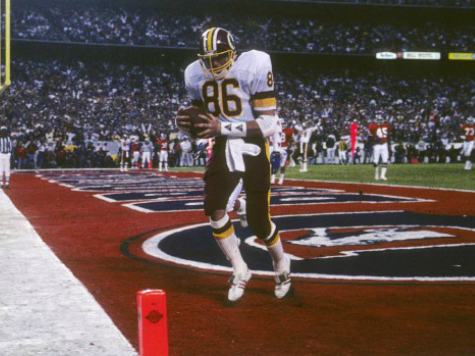Arnold Schwarzenegger transitioned from bodybuilder to actor to governor of California. New York Knicks forward Bill Bradley was elected to the Basketball Hall of Fame and the United States Senate. Bob Mathias won a decathlon gold medal at the Olympics several decades before winning a seat in the House of Representatives.
But the career change from sports to politics, as several athletes discovered this morning, isn’t as easy as the Terminator made it seem.
Frank White, former Royals great, picked up a seat on the Jackson County, Missouri, executive board. But he appears as one of the few former athletes to know the thrill of victory rather than the agony of defeat on election night.
In Washington state’s 4th district, former Washington Redskins end Clint Didier trails Dan Newhouse. The congressional race marked a first for the Evergreen State: both general election candidates belong to the same party (Republican). With much of the vote still to be counted, Tea Party-backed Didier looks like a longshot.
Former Lions, Eagles, and Cowboys linebacker Gary Cobb fell short in his race against State Senator Donald Norcross. Cobb, a Republican, hoped to replace Rob Andrews in the House of Representatives. The heavily-Democrat district rebuffed his efforts.
With the departures of New Jersey Republican John Runyan and North Carolina Democrat Heath Shuler in the last two cycles, and the defeats of Cobb and Didier, the Congress that convenes in January will be the first one without a former professional athlete in it in more than a half century. “The unbroken string of pro athlete congressmen — they have all been men — goes back to Arizona icon Mo Udall, who came to Congress in 1961 after a legal career and a stint playing pro basketball for the Denver Nuggets before the team joined the NBA,” USA Today‘s Paul Singer points out.
Perhaps the novelty of electing celebrity athletes has worn off for voters. Perhaps the novelty of running for office doesn’t play as novelty any longer for former jocks. Whatever the cause, pro athletes increasingly staying out of Congress has corresponded with Congress getting into pro athletics. Legislation aimed at ending the “Redskins” nickname, open letters to the NFL commissioner decrying the conduct of individual players, and various state revenue schemes involving sports gambling play as a few of the ways the wall of separation of sport and state has crumbled.
The likes of Jack Kemp, Jim Bunning, and Tom McMillen no longer roam the halls of the Capitol. More than one hundred lawyers do. Perhaps the popularity contests won by hardcourt heroes and gridiron stars harms democracy. But it’s not as though the frequent alternative of dynastic politics–Gary Cobb, for instance, lost to the son of New Jersey political powerbroker George Norcross–proves healthier. The next round in two years may show whether athletes taking their ball and going home plays as a mere timeout or an actual trend.

COMMENTS
Please let us know if you're having issues with commenting.